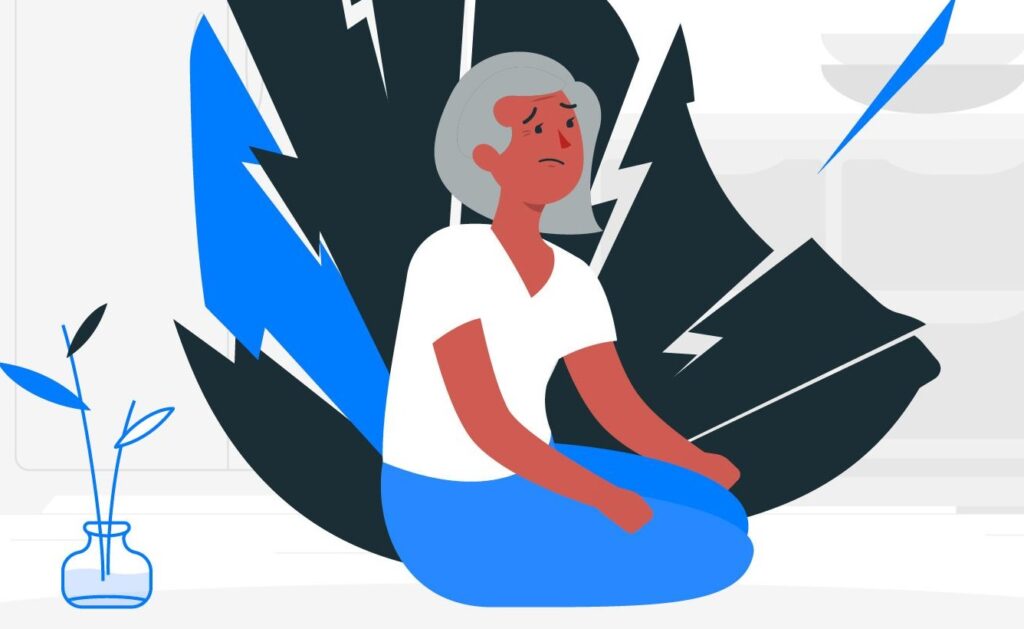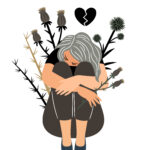Anticipatory Grief: Feeling Loss Before Death

Grief is often thought of as something that happens after death, but it can be felt long before someone dies. Let’s take a look at anticipatory grief.
This blog is a part of our Living With Loss: Grief Campaign.
To see more campaign content, click here.
What is anticipatory grief?
Anticipatory grief is when you feel loss before someone dies, possibly long before they actually die. You might experience anticipatory grief if a loved one is diagnosed with an illness that affects them for a long time before they die, for example, terminal cancer or dementia.
What does anticipatory grief feel like?
Just like grief, you can experience anticipatory grief in different ways. Some feel fear, isolation, sorrow or confusion, and many other emotions. There’s no right or wrong way of feeling.
As well as grieving for the unwell person, you might be grieving changes in your relationship or identities. You might struggle with the loss of plans that won’t work out, for example, knowing your loved one won’t be there for a special event in the future like your graduation, wedding, or birth of a child.
Sometimes, experiencing anticipatory grief can make it hard to cope with time as you worry that it’s running out.
Supporting someone through anticipatory grief
People who experience anticipatory grief may appreciate being directed to organisations and services that can offer support. You can find some support here or at the bottom of this page.
Avoid saying things like “at least they’re still here” or “you still have time together”. Their lives will have changed knowing that they are losing a loved one whilst also possibly caring for them, and it can be hard to feel grateful. Saying those kinds of things could make them feel guilty.
Offer them a safe space to talk and share their feelings without judgement if they want to. Listen. You don’t need to say or do anything to try to fix the situation.
Getting help
Try not to feel guilty about the way you’re feeling if you feel that things are too much. It’s okay to feel like this, and it’s okay to look for support if you need it. Nobody needs to go through grief alone, and getting support means you can continue to support your loved one through their illness. Talking about how you’re feeling can help, and there are lots of services that can offer this.
It’s important to know that feelings of anticipatory grief won’t lessen feelings of grief once a loved one dies. It can often feel like experiencing the loss of a loved one all over again.
Marie Curie
Provides care and support for people living with a terminal illness and their families. Their support line (for 18+) provides bereavement support for people in Wales. 0800 090 2309.

Hope Again
A youth website by Cruse Bereavement Support. A safe place where you can learn from other young people how to cope with grief and feel less alone. Call the Cruse helpline on 0808 808 1677 between 9:30 and 5pm Monday and Friday and between 9:30 and 8pm Tuesday, Wednesday, and Thursday. Visit their website to find support in your area.
Winston’s Wish
Helping children, teenagers and young adults to find their feet when their worlds are turned upside down by grief. Their Help 2 Make Sense website has advice, tips, and real-life stories from other grieving young people. Visit their website for information about the grief support available, including Live Chat, Email, Helpline, counselling, support, resources and activities.

Grief Encounter
Supporting bereaved children and young people. The Grieftalk helpline offers confidential, emotional support and guidance to anyone affected by grief. 0808 802 0111 9am-9pm weekdays Visit their website for details about counselling, workshops and other resources that can help.

Talk to Meic
Free and confidential helpline for children and young people up to 25 in Wales. Help if you’re worried about something, have questions, or need information or advice. We can put you on the right track if you don’t know who to contact. We can even help you talk to others if you’re struggling. Call our helpline from 8am to midnight every single day: 080 880 23456 or chat to us online.
























